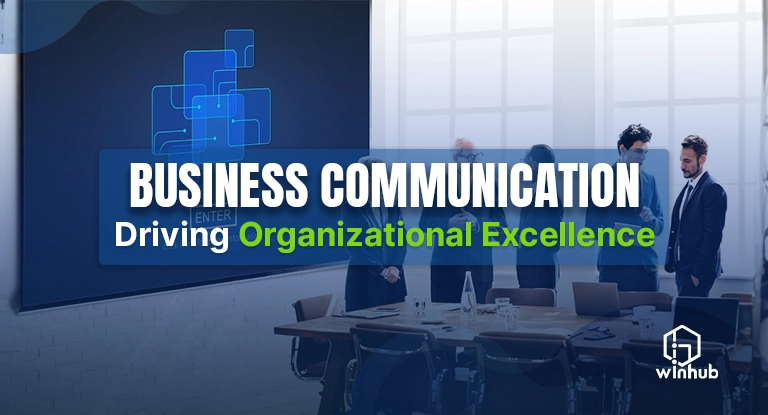Effective communication is a key factor in business and can sometimes make or break a company. As organizations navigate a globalized and interconnected world, conveying information concisely and persuasively becomes extremely important.
Understanding Business Communication
Business communication is the systematic process of conveying information within and outside an organization to facilitate the right decision-making, collaboration and the achievement of organizational goals. It involves the exchange of verbal or written messages through various channels such as meetings, emails, reports and presentations. Successful business communication is characterized by clarity, conciseness and relevance, ensuring that information is accurately transmitted and understood by the intended audience. It serves as the lifeline of organizational operations, fostering internal cohesion among employees and teams, and enables professional and effective external interactions with clients, partners and stakeholders. In essence, business communication is the vital thread that weaves together the intricate fabric of an organization, shaping its culture, guiding its strategies and ultimately driving its success.
The Importance of Business Communication
At the heart of every thriving organization lies a robust communication framework. Clear communication is not merely a nicety but a fundamental necessity for achieving organizational goals. Here are ways business communication helps organizations achieve success:
Team Cohesion and Collaboration
Internal communication within an organization is the backbone that supports team cohesion and collaboration. Effective flow of information across departments ensures all members are well aware of the organization’s overarching goals and expectations. Clear and thorough communication creates a shared understanding among team members, fostering a sense of unity and collective purpose. When everyone is on the same page, collaboration becomes more natural and efficient, leading to increased productivity and innovation. Regular team meetings, collaborative platforms and open communication channels contribute to building a cohesive and well-informed workforce.
Driving Operational Efficiency
The gears of business operations turn smoothly when fueled by proper business communication. From disseminating critical project updates to coordinating day-to-day tasks, clear communication is the catalyst for operational efficiency. Organizations that prioritize communication find themselves better equipped to adapt to changes, respond promptly to challenges and capitalize on emerging opportunities. Whether it’s through the use of team collaboration tools, project management platforms or regular status updates, streamlined communication processes contribute to the overall effectiveness of business operations.
Building Strong External Relationships
External communication is the face an organization presents to the world. It involves conveying the values, mission and offerings of the business to clients, partners and stakeholders. An organization with strong external communication skills can build and maintain positive relationships in the market. The ability to articulate a compelling narrative and maintain transparent communication with clients and partners is crucial for establishing brand loyalty and growth. From marketing campaigns to client interactions, external communication shapes the public perception of the organization.
Enhancing Leadership and Management
Successful leadership goes hand-in-hand with proficient communication. Leadership isn’t just about setting a vision; it’s about articulating that vision in a way that inspires and motivates others. Transparent communication from leadership creates trust among employees and contributes to building a positive organizational culture. Managers who excel in communication can provide clear expectations, offer constructive feedback and support the professional development of their teams. The ability to convey a strategic vision, articulate goals and communicate expectations is fundamental to leadership and management.
Resolving Conflicts and Mitigating Risks
Conflicts are an inevitable part of organizational life, but business communication provides a constructive means for resolution. Open and transparent communication channels enable the identification and addressing of conflicts at an early stage, preventing them from escalating into more significant issues. Moreover, clear communication is integral to risk management, ensuring that potential issues are identified and mitigated before they can adversely impact the organization. By fostering an environment where concerns can be openly addressed, effective communication contributes to a healthier and more resilient organization.
Supporting Decision-Making Processes
Informed decision-making relies on accurate and timely information. Communication ensures that decision-makers have access to the data and insights needed to make informed choices. Whether it’s a strategic decision at the executive level or a tactical decision within a specific department, communication channels must be robust to facilitate the exchange of relevant information. Clear communication during decision-making processes contributes to well-informed choices, aligning the organization with its strategic objectives.
Adapting to Change and Navigating Uncertainty
In the dynamic business environment, change is constant, and uncertainty is a given. Organizations equipped with proper communication strategies can navigate these challenges more adeptly. Communication becomes a tool for managing change, keeping employees informed about changes, addressing concerns and maintaining a sense of stability during transitions. Transparent communication during times of uncertainty builds trust among employees and creates an environment where individuals feel more secure and engaged.
Innovation and Creativity
Innovation thrives in an environment where ideas can be freely shared and discussed. Business communication helps companies create a culture of innovation and creativity. When employees feel comfortable expressing their thoughts and perspectives, it fuels a continuous cycle of ideation that can lead to groundbreaking solutions and improvements. Open communication channels, brainstorming sessions and a culture that values diverse perspectives contribute to an innovative and forward-thinking organizational environment.
Building a Positive Organizational Culture
An organization’s culture is shaped by its values, beliefs and behaviors, all of which are communicated through various channels. Effective communication plays a pivotal role in cultivating a positive organizational culture. When communication is transparent, respectful and inclusive, it contributes to a work environment where employees feel valued and motivated. A positive organizational culture, reinforced by proper business communication, increases employee satisfaction, higher retention rates and a more attractive workplace for top talent.
Meeting Customer Expectations
External communication extends to customer interactions, where meeting and exceeding expectations is paramount. Whether through marketing messages, customer support interactions or product information, communication plays an important role in customer satisfaction. Businesses that can articulate their value proposition clearly, respond to customer inquiries promptly, and maintain consistency in their messaging are more likely to build and retain a loyal customer base. External communication, when done effectively, enhances the overall customer experience and contributes to the success of the business in the marketplace.
Enhance Your Business Communication Skills With WinHub
Business communication is a dynamic force that evolves alongside technological advancements and shifts in the business landscape. By emphasizing proper business communication, organizations can build a communication framework that propels them toward success. To learn more on how to enhance communication expertise for your business, check out WinHub’s Marketing & Communications services.



